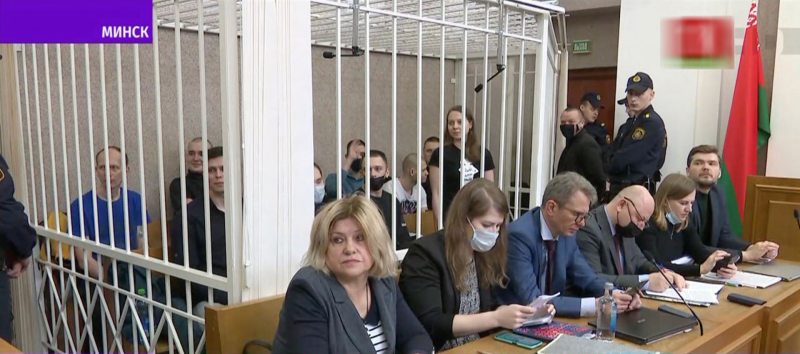Viasna member Marfa Rabkova gets 15 years in jail, volunteer Andrei Chapiuk — 6
The Minsk Municipal Court announced the sentence of ten political prisoners at once: coordinator of Viasna’s volunteer network Marfa Rabkova, volunteer Andrei Chapiuk, activists of the anarchist movement Akikhiro Hayeuski-Hanada, Aliaksandr Frantskevich, Aliaksei Halauko, Aliaksandr Kazlianka, Pavel Shpetny, Mikita Dranets, Andrei Marach, and Danila Chul.
The closed-door court lasted four and a half months. A total of 70 sessions were held on 158 criminal case files. Prosecutor Raman Biziuk requested 5 to 17 years in jail for the defendants in the case. Judge Siarhei Khrypach handed down the sentences on September 6. The judge satisfied the prosecutor's demand and imposed the exact terms as requested.
The ten political prisoners were given the following terms:
- Aliaksandr Frantskevich—17 years of imprisonment
- Akikhiro Hayeuski-Hanada—16 years of imprisonment
- Marfa Rabkova—15 years of imprisonment
- Aliaksei Halauko—12 years of imprisonment
- Pavel Shpetny, Mikita Dranets, Aliaksandr Kazlianka, and Andrei Chapiuk—6 years of imprisonment each
- Andrei Marach and Danila Chul—5 years of imprisonment
Marfa Rabkova became the political prisoner with the longest sentence in a political case among women. On September 17, it will be two years since the human rights activist has been kept behind bars in pre-trial detention center.
What were the political prisoners accused of
The process took place behind closed doors because “there are materials of extremist nature in the criminal case records.” As reported by the Investigative Committee, the prosecutor's office, and pro-government media, political prisoners Marfa Rabkova, Andrei Chapiuk, Akikhiro Hayeuski-Hanada, Aliaksandr Frantskevich, Aliaksei Halauko, Aliaksandr Kazlianka, Pavel Shpetny, Mikita Dranets, Andrei Marach, and Danila Chul were accused of organizing, leading or participating in the anarchist groups Revolutionary Action in Belarus and Ukraine and People's Self-Defense and are tried for events from 2016–2020.
Remarkably, the Internet resources of the Revolutionary Action and People's Self-Defense were recognized by the Ministry of Internal Affairs as an extremist formation on November 2, 2021, only 8 to 15 months after the detention of the last of the ten defendants in the case. However, some of them were still accused of ‘establishing and participating in an extremist formation’ under Parts 1 and 3 of Article 361-1 of the Criminal Code.
Investigation Committee characterized three political prisoners, including Marfa Rabkova, as organizers and leaders of a number of “organized criminal groups that had independent units in the regions of Belarus with their own leaders”.
As the result, defendants were charged under 10 articles of the Criminal Code depending on their role:
- Part 1 of Article 293 ‘organization of riots’—Aliaksandr Frantskevich, Marfa Rabkova, and Akikhiro Hayeuski-Hanada
- Part 1 of Article 13 and Part 2 of Article 293 ‘preparation for participation in mass riots’— Aliaksandr Frantskevich, Marfa Rabkova, Akikhiro Hayeuski-Hanada, Andrei Chapiuk
- Part 3 of Article 293 ‘training of individuals to participate in mass riots’— Aliaksandr Frantskevich, Marfa Rabkova, and Akikhiro Hayeuski-Hanada
- Part 1 of Article 285 ‘creation of a criminal organization or its leadership’—Akikhiro Hayeuski-Hanada, Aliaksandr Frantskevich, Aliaksei Halauko, and Marfa Rabkova
- Part 2 of Article 285 ‘participation in a criminal organization’— Andrei Chapiuk, Andrei Marach, Pavel Shpetny, Aliaksandr Kazlianka, Mikita Dranets, and Danila Chul
- Part 3 of Article 361 ‘сalls for actions aimed at causing harm to the national security of the Republic of Belarus’—Akikhiro Hayeuski-Hanada, Aliaksandr Frantskevich, and Marfa Rabkova
- Part 1 and 361-1 of Article 361-1 ‘creation of an extremist formation, or participation in it’—Akikhiro Hayeuski-Hanada, Aliaksandr Frantskevich, Aliaksei Halauko, and Marfa Rabkova
- Part 1 of Article 342 ‘organization and preparation of actions that grossly violate public order, or active participation in them’ (for a rally on March 5, 2017)—Pavel Shpetny, Aliaksandr Kazlianka, Mikita Dranets, Aliaksei Halauko, Andrei Marach, Aliaksandr Frantskevich, and Akikhiro Hayeuski-Hanada
- Part 1 of Article 342 ‘organization and preparation of actions that grossly violate public order, or active participation in them’ (for blocking the M1 highway in Brest in 2018)—Akikhiro Hayeuski-Hanada, Aliaksandr Kazlianka, Aliaksandr Frantskevich, Mikita Dranets, Aliaksei Halauko, and Danila Chul
- Part 1 of Article 130 ‘incitement of hatred’— Andrei Chapiuk
- Part 3 and Article 130 ‘incitement to hatred’—Akikhiro Hayeuski-Hanada, Aliaksandr Frantskevich, and Marfa Rabkova
- Part 2 of Article 339 ‘hooliganism committed by a group of persons’ (for throwing light bulbs with paint into billboards of the traffic police in 2016 and into the National State TV and Radio Company building in 2016)—Marfa Rabkova and Aliaksandr Frantskevich;
- Part 2 of Article 339 ‘hooliganism committed by a group of persons’ (for a smoke grenade thrown into the building of the Brest GUBOPiK in 2016)—Pavel Shpetny, Akikhiro Hayeuski-Hanada, Aliaksandr Frantskevich, and Marfa Rabkova
- Article 341 ‘desecration of buildings and damage to property’ (for a graffiti in Brest in 2020)—Akikhiro Hayeuski-Hanada, Aliaksandr Frantskevich, Aliaksei Halauko, Marfa Rabkova, and Andrei Marach
- Article 341 ‘desecration of structures and damage to property’ (for a graffiti against the European Games in 2019)—Akikhiro Hayeuski-Hanada, Andrei Chapiuk, Aliaksandr Frantskevich, and Marfa Rabkova
- Part 3 of Article 218, Part 3 of Article 339, Part 2 of Article 295-3 ‘illegal actions in relation to objects which action is based on the use of combustible substances committed by a group of persons’ (for arson of the Homieĺ tax inspection and a billboard of the Department of Compulsory Execution of Punishment in Ivacevičy in 2017)—Aliaksandr Frantskevich, Marfa Rabkova, and Akikhiro Hayeuski-Hanada
According to Aliaksandr Kazlianka, eight of ten people refused to testify in the case. A separate criminal case against Dzmitryi Liauchuk, Artur Kandratovich, Raman Khalilau, and Yauhen Zhurauski, who went abroad, as well as “unidentified persons” was singled out.


















